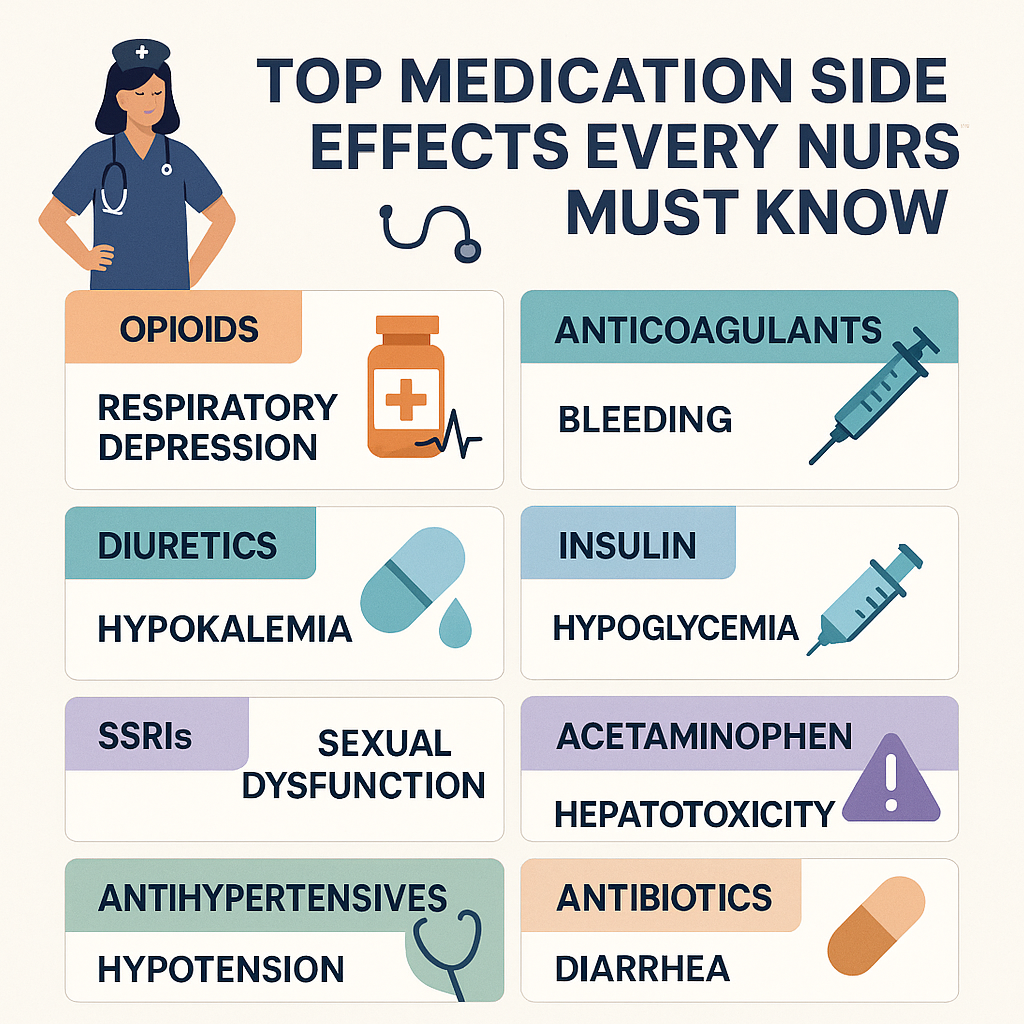When it comes to patient safety, one of the most important responsibilities a registered nurse (RN nurse) holds is knowing how to recognize common medication side effects. These adverse effects can range from mild discomforts to life-threatening reactions. For nursing students, new grads, and anyone prepping for the NCLEX, this guide provides a simplified yet detailed breakdown of side effects you must monitor—across multiple drug classes.
This article is part of your ultimate nursing bundle and is designed to help every nurse confidently catch red flags before they become emergencies.
✅ Why Side Effects Matter in Nursing
Whether you’re studying for the NCLEX or caring for real patients, recognizing medication side effects is a core skill. Not all patients will report how they feel, so it’s up to the nurse to assess for subtle signs and symptoms.
Knowing what to look for can help prevent:
- Adverse drug reactions
- Medication errors
- Hospital readmissions
- Patient harm
💊 Common Medication Classes & Their Side Effects
Below are frequently tested drug classes on the NCLEX, along with their hallmark side effects that RN nurses should never ignore:
1. Opioids (e.g., Morphine, Hydromorphone)
- Common Side Effects: Drowsiness, constipation, nausea
- Severe: Respiratory depression, hypotension
- RN Tip: Monitor respiratory rate and LOC (level of consciousness). Hold if RR < 12.
2. ACE Inhibitors (e.g., Lisinopril, Enalapril)
- Common: Dry cough
- Severe: Angioedema, hyperkalemia
- RN Tip: Monitor for swelling of lips/tongue; check potassium levels.
3. Beta Blockers (e.g., Metoprolol, Propranolol)
- Common: Fatigue, bradycardia
- Severe: Heart block, bronchospasm
- NCLEX Alert: Avoid in asthma/COPD. Monitor apical pulse before administration.
4. Antibiotics (e.g., Vancomycin, Penicillins, Aminoglycosides)
- Common: GI upset, rash
- Severe: Nephrotoxicity, ototoxicity (especially with vancomycin or gentamicin)
- RN Tip: Monitor BUN/Creatinine and hearing changes.
5. Anticoagulants (e.g., Warfarin, Heparin, DOACs)
- Common: Easy bruising, bleeding
- Severe: Hemorrhage
- RN Tip: Check INR (for warfarin), PTT (for heparin). Monitor for black stools, gum bleeding.
6. Diuretics (e.g., Furosemide, Hydrochlorothiazide)
- Common: Increased urination
- Severe: Hypokalemia, dehydration, hypotension
- RN Nurse Reminder: Monitor electrolytes and blood pressure.
7. Insulin & Oral Hypoglycemics (e.g., Lispro, Metformin)
- Common: Hypoglycemia (shakiness, sweating)
- Severe: Lactic acidosis (with metformin)
- Nursing Bundle Tip: Know onset/peak times for insulin. Hold metformin if patient is undergoing contrast studies.
8. SSRIs (e.g., Fluoxetine, Sertraline)
- Common: GI upset, insomnia
- Severe: Serotonin syndrome (agitation, muscle rigidity, fever)
- NCLEX Tip: Monitor for increased suicidal thoughts in early treatment phase.
9. Digoxin (Cardiac Glycoside)
- Common: Nausea, fatigue
- Severe: Bradycardia, visual changes (yellow halos)
- RN Note: Check apical pulse for 1 full minute. Hold if HR < 60 bpm. Monitor dig level and K+.
10. Calcium Channel Blockers (e.g., Amlodipine, Diltiazem)
- Common: Edema, constipation
- Severe: Hypotension, heart failure
- Registered Nurse Tip: Monitor BP and signs of worsening CHF (crackles, SOB).
📋 General Nursing Interventions for Side Effects
Here are NCLEX-aligned nursing interventions for managing side effects:
| Intervention | When to Use |
|---|---|
| Hold the medication | If vital signs are outside safe range |
| Notify the provider | For severe reactions or abnormal labs |
| Monitor labs | Check electrolytes, liver/kidney function, and drug levels |
| Educate the patient | Teach about signs of serious side effects |
| Document thoroughly | Always record the patient’s response and what actions you took |
🧠 NCLEX Quick Quiz
Question: A patient receiving vancomycin IV reports ringing in the ears. What is the nurse’s priority action?
A. Administer the next dose early
B. Hold the medication and notify the provider ✅
C. Give an antihistamine
D. Increase the IV rate
📝 Rationale: Tinnitus may signal ototoxicity, a serious side effect. Always assess and report before continuing the drug.
🔄 Recap: What Every RN Nurse Should Know
For NCLEX success and safe practice, memorize these core drug side effects and what to do when you see them. Every nurse—from student to seasoned registered nurse—needs this info in their nursing bundle of essential tools.
Don’t just memorize. Understand the “why” behind each symptom. Early action can save a life.

